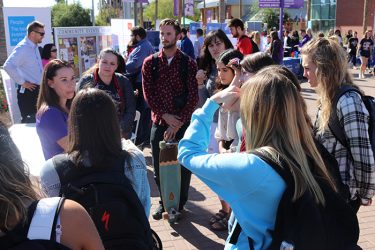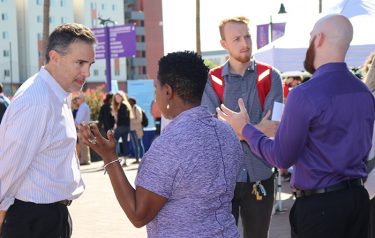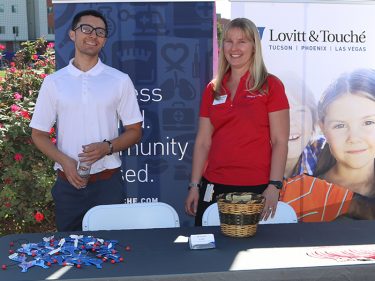Story by Rick Vacek
Photos by Caitlin Cartwright
GCU News Bureau
Of all the lessons students can learn before they get out in the working world, one of the most useful is how to handle their finances. It could mean the difference between being cash poor and having a debt of gratitude.
The Colangelo College of Business at Grand Canyon University is doing its part this week to provide that educational capital with its annual Money Week, otherwise known as “speed dating for your wallet.”

The four-day event features 20-minute talks on a variety of financial topics, and it also gives students a chance to explore the job market by meeting with representatives of almost 40 companies in the industry – insurance, banks and finance. It will end Thursday with a 45-minute presentation by Phoenix business icon Jerry Colangelo and a guest panel at 5:30 p.m. on the second floor of the Student Union.
The message all week has been clear: This information is budget-friendly.
“Financial literacy in the U.S. is way down,” said CCOB instructor Mark Jacobson, who did the “Home Mortgage 101” presentation Wednesday morning. “We’re trying to give them exposure to this stuff much earlier, with much more information.
“Even if they’re three to five years away from buying a home, they should start thinking about it.”
Recent reports indicate that more 20-somethings are thinking instead about moving back in with their parents and delaying any type of ambitious expenditure. One of the culprits is student loan debt, which has reached $1.3 trillion, according to Make Lemonade, a personal finance marketplace.

GCU has been trying to do its part to reverse that trend by freezing tuition for the last nine years and helping students graduate early when possible. But even if student loan debt is unavoidable, other credit issues can be mitigated if handled properly, as Tim Kelley, Assistant Professor for Entrepreneurship and Economics in CCOB, pointed out in his Money Week session, “Understanding Credit.”
“The benefit of being debt-free is that it allows you to pursue new opportunities,” Kelley said. “At a young age, that’s where you should be. You should be able to travel the world, go take that crazy internship, go work for that startup, switch jobs.
“If you’re tied to debt, then your fear is always, ‘How am I going to be able to make that payment if I quit my job?’ Paying off your student debt as quickly as possible, preferably while you’re going to school, is the right way to go.”
Most of the questions Kelley hears from students are about investing – not a surprise given that they’re business majors. But he considers it a far greater concern in America that so many people don’t save any money.
“I think we would be a much more dynamic nation if we were able to liberate ourselves a bit from our debt spending,” he said.

It’s never too early to start saving money for retirement, so it was appropriate that one of the Money Week sessions was on exactly that. It was taught by Ashley Hardin, a former GCU student-athlete who’s now a financial analyst for Primerica Financial Services. Talk about a habit that has escaped too many people: The Wall Street Journal reported this week that savings in the U.S. are at a 10-year low.
“The earlier you start saving, the less you have to put away,” Hardin said. “You look at the big picture. What are some minor tradeoffs that you can make now to ultimately reach what your goals are? This is just temporary – this is for right now.”
Understanding the industry right now also was the goal of Money Week, and that means hooking up students for internships and full-time jobs. One of those interns at the Career Opportunities fair Wednesday was senior marketing major Tanner Lobato, who helps with social media and website design and researches leads for Lovitt-Touché, a Phoenix insurance company.
Lobato works 24 hours a week for the company while taking a full courseload and also helping out in the Recreation Department for the City of Surprise on weekends. He’s a busy guy, but not too busy to see what his internship is doing for him.

His favorite part of it? “Just being able to apply what I’ve learned through GCU to an actual professional environment. It’s a rewarding feeling to see that what I learned in school transfers over.”
Same goes for what’s being taught in Money Week. CCOB offers these lessons in its Personal Finance elective class (FIN-210), and Jacobson, who teaches finance, said he plans to repeat his Mortgage 101 messages in a future class.
The latest statistics, according to reports, show that 43 percent of Americans with student loan debt are behind on their payments or have postponed them. No wonder the average age of first-time homebuyers has gone from 31 to almost 34.
“Lots of young people are delaying that,” Jacobson said. “They’re moving back home, they’re pushing it off, they’ve got student loans.
“What was mid-20s for most of us in previous generations is now 30. But that doesn’t mean they shouldn’t know what’s going on and understand it.”
Many students smartly budgeted their time for Money Week. Now it’s up to them to make it pay off.
Contact Rick Vacek at (602) 639-8203 or [email protected].




































